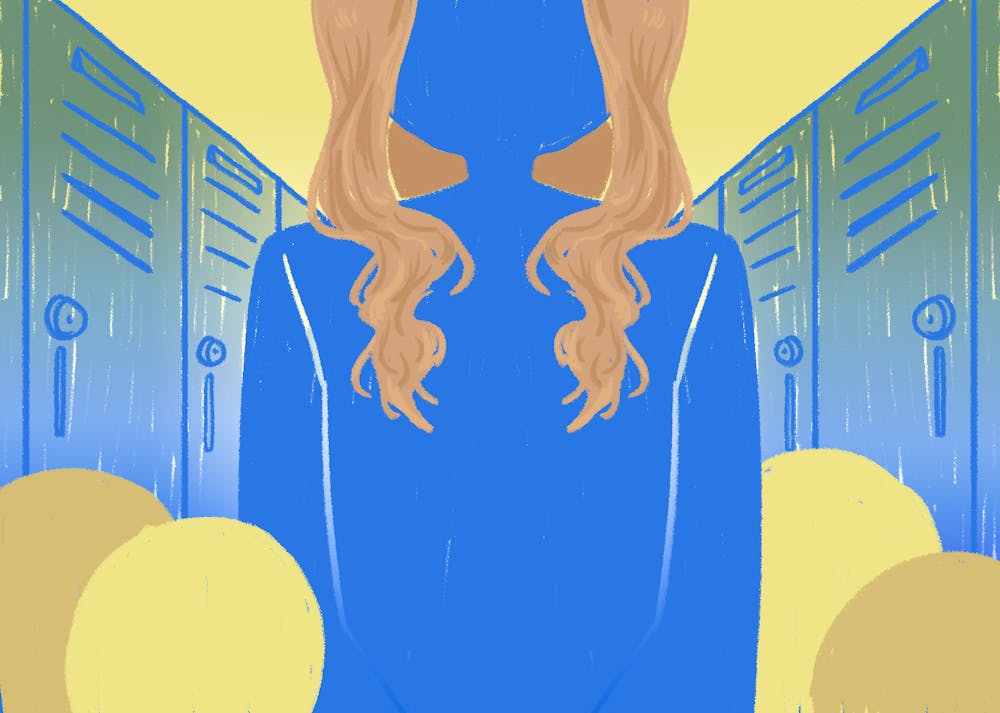Earlier this month, Netflix released the romantic comedy "Tall Girl 2," the bland, uninviting sequel to an even blander original.
The film series (unfortunately) returned with a different director, although toting the same screenwriter and much of the same cast, starring Ava Michelle and Griffin Gluck as Jodi Kreyman and Jack Dunkleman, respectively.
This would've been fine, and maybe a chance for redemption if not for the hackneyed plot devices, tonal inconsistencies with the last film and the simple fact that nobody asked.
To give the rundown, "Tall Girl," the first was incredibly problematic.
Jodi, the protagonist, complains about the difficulty of being a tall, size-13-shoe-wearing teenager, despite living a life of wealth and privilege in every other aspect. As you'd imagine, the internet had a field day with that.
Toward the end of the movie, Jodi makes a speech where she gains confidence and accepts the romantic overtures of her long-time friend Jack Dunkleman, despite the pair's height difference. The plot wraps up pretty neatly.
The intense backlash the first film received was well deserved. So, when I saw Netflix released the second installment, I was intrigued as to what they'd done to address the controversy. As it would turn out, they did the bare minimum.
The film defended its predecessor's insensitivity with the a short conversation in the first 10 minutes.
When Jodi auditions for a school play, the drama teacher reiterates the core issue with the first film: Being tall is hardly the most difficult thing human beings must contend with, and that Jodi is otherwise privileged.
She just responds, "It just doesn't make all the bad things that have happened to me every day of my entire life any less real."
This statement, while valid, seems like a cheap trick to get the controversy out of viewers' minds, and it seems odd for a random drama teacher to bring this up. I was struck by the utter laziness of this plot device, and more so by its contradiction with the first film, where Jodi famously says, "You think your life is hard? I'm a high school junior wearing size 13 Nikes."
And that's not the only way the writers slacked off.
In the unoriginal central premise of "Tall Girl 2," the golden couple loses its shine on a romantic holiday, no less. The relationship then falls casualty to a kindhearted and ridiculously understanding interloper.
And I don’t just mean that it’s formulaic. Netflix has done the same thing before.
Queue "To All the Boys: P.S. I Still Love You," the second installment of the streaming giant's other, far more notable teen rom-com series. While watching "Tall Girl 2," I made the connection in no time, shocked at the plot recycling, hoping that I was mistaken.
I wasn’t.
The plot line was contrived when "To All the Boys" did it, but the series had the smash success of its first film behind it and could afford to rest on its laurels. "Tall Girl 2" has no such thing.
The reused and unoriginal plot aside, the film's tonal shift was jarring. In yet another last-ditch effort to rehabilitate the film's image, the side characters take on a more comedic role.
Villainess Kimmy (Clara Wilsey) and her sycophant Schnipper (Rico Paris) take on an odd comedic-relief role, and Stig (Luke Eisner), the last film's duplicitous heartthrob, does much of the same.
The film's creative team also failed to blend their artistic vision with the previous one. Although the acting is marginally better, the film is still held back by its poor writing.
While the film maintains an odd, farcical tone, it attempts to address real issues, such as anxiety, bullying and body dysmorphia, among others. The writers fail to balance this, however, and the back and forth between comedy and depth leaves the viewer feeling confused.
The actors execute these moments of honesty deftly. Jan Luis Castellanos, who plays Tommy Torres (the aforementioned interloper), and Ava Michelle pull it off to the best of their ability.
As for our main couple? By the end of this movie, I had completely lost interest in them. For all that the first "Tall Girl" had wrong with it, the relationship between the main leads was not the issue.
By the end of this film, this relationship had been dragged through the mud for the sole purpose of creating more content. No amount of Dunkleman's customary love-bombing could fix that. I found myself rooting for the side couples and Kimmy's redemption arc instead.
While "Tall Girl 2" showed promise, poor execution and even worse writing hindered it, instead adding more credence to the burgeoning hatred the franchise is facing.
Reach the reporter at srkrish5@asu.edu and follow @shradhakrish on Twitter.
Like The State Press on Facebook and follow @statepress on Twitter.




